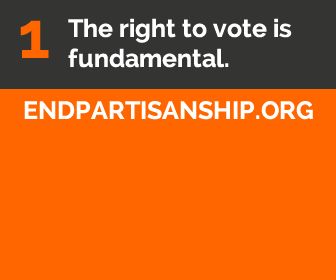U.S. Senator Charles Schumer Says We Need to End Partisan Primaries

 op-ed in the New York Times declaring that in order to “save America” it was necessary to “end partisan primaries.”
op-ed in the New York Times declaring that in order to “save America” it was necessary to “end partisan primaries.”
In the article, Schumer said that his motivation stemmed from the increasingly problematic polarization of Washington politics, which is exacerbated by a primary system where energized ideologically-driven groups turn out in droves and push candidates to even further extremes to court these voters.
Schumer, instead, calls for the adoption of a top-two primary:
"We need a national movement to adopt the “top-two” primary (also known as an open primary), in which all voters, regardless of party registration, can vote and the top two vote-getters, regardless of party, then enter a runoff."
It is worth pointing out that Schumer's language doesn't quite grasp the concept of a nonpartisan, top-two primary like what is currently in place in California and Washington state. It is important to unpack the difference between these terms and the problems inherent within. The system Schumer is advocating provides important changes to explain and expound upon.
Schumer says that a top-two primary is also called an "open primary," which is not entirely true. There are currently 18 states with an open primary system, a number that does not include California, Washington state, or Louisiana, which have a system close to or similar to what Schumer is talking about.
An open primary merely means that all voters, regardless of party affiliation, have have an opportunity to select the ballot of their choice in the primary election. The 18 states with open primaries have what could better be described as open partisan primaries.
These states require voters to choose between party ballots in order to participate in primary elections, and voters cannot vote in another party's primary. The purpose of these elections is to choose party candidates -- a private purpose.
The top-two primary system is designed to be a nonpartisan system.
The purpose of "Top-Two" is not to select the candidates of a party in individual party elections, but to give every voter, regardless of political affiliation, an equal voice in one election to decide which candidates they want to move on to the general election. All voters and candidates participate on a single ballot, and the top two vote-getters, regardless of party affiliation, move on to the general election.
While "Top-Two" can be called a nonpartisan, top-two open primary, it cannot be described as simply "an open primary."
Schumer also makes the mistake of mixing up the nonpartisan systems in California and Washington state with the system in Louisiana. He says the top two vote-getters from the primary enter a runoff. This is not true of the systems in California and Washington state.
A runoff election is common in primary systems where none of the candidates in a race are capable of reaching a certain threshold of votes, whether it is a set percentage (like 35%) or a simple majority. If a candidate manages to reach this threshold then there is no need for this additional round of voting.In partisan systems, runoff elections are held when candidates fail to garner a certain percentage of the vote in the primary, and an additional round of voting is needed to decide who will represent the party in the general election.
In the top-two primary systems in California and Washington state, the top two vote-getters move on to the general election regardless of how many votes they get. A candidate can garner 75 percent of the primary vote, and the candidate who came in second in the primary will still move on to the general election. The term "runoff" is not applicable when talking about the general election.
In Louisiana, the first round of elections is held on the same election day that the other 49 states hold their general elections. Under this system, if a candidate can break the 50 percent threshold, there is no need for a second round of voting. However, if no candidate in a race gets more than 50 percent of the vote, the top two vote-getters move on to what is appropriately called a runoff election.
While Schumer may not entirely understand the difference between top-two primaries and open primaries, he has joined a growing effort to implement nonpartisan elections nationwide. He is a well-known senator calling for an end to partisan primaries in a major newspaper. This is certainly a big step in the right direction.
Photo Source: Christian Science Monitor




